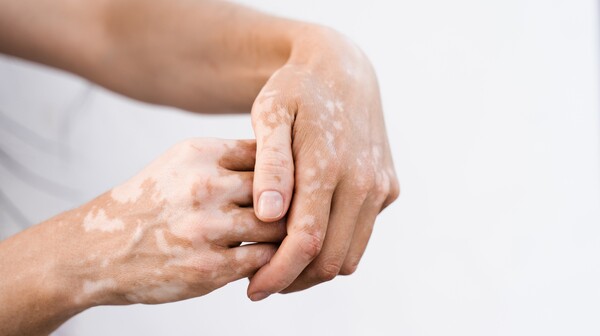A new clinical trial now underway in New South Wales and Queensland is offering hope to the approximately 260,000 Australians living with vitiligo. This autoimmune skin condition can have a profound impact on mental health and well-being.
Vitiligo affects approximately one in every 100 Australians, resulting in the loss of skin pigment in visible patches. While not painful or contagious, the condition can lead to severe emotional distress, particularly for those with darker skin or more visible depigmentation. Despite its prevalence, public understanding of vitiligo remains limited.
The campaign accompanying the clinical trial aims to change that by raising awareness and encouraging greater acceptance of those living with vitiligo. Prominent figures such as Winnie Harlow, Jon Hamm, and Pia Miranda have helped bring visibility to the condition through their own personal experiences.
At the centre of this new trial is FB102, an investigational drug being studied as a potential treatment to prevent the immune system from mistakenly attacking healthy pigment-producing cells. By calming this autoimmune response, FB102 may enable skin cells to recover and regain their natural colour.
Early-stage results have been encouraging. The drug has previously shown positive outcomes in a Phase 1b trial for coeliac disease, demonstrating both safety and early signs of benefit. If successful in vitiligo, FB102 could represent a new and innovative approach, offering an alternative to current treatments such as steroid creams, light therapy, or oral medications — which often provide only temporary or partial relief.
Dr Seemal Desai, President of the Global Vitiligo Association and former President of the American Academy of Dermatology, said research like this is essential to improving lives. “There is currently no cure for vitiligo, but continued research into new treatments is important to improve the quality of life for people living with the condition. Clinical trials like this one are a crucial part of that journey, offering new hope to individuals who have lived with this condition for many years.”
For Faye Colley, President of the Vitiligo Association of Australia, the condition's visibility often masks deeper challenges. “Whilst vitiligo is a visible difference, it’s often what you don’t see that has the greatest impact. It’s the feeling of being viewed differently by society that affects people’s mental health the most. We need more public awareness to foster a more inclusive and accepting society.”
The FB102 study is being conducted in Australia by Forte Bioscience, with clinical trial recruitment supported by Evrima, a company specialising in connecting patients with research opportunities.
Charlotte Bradshaw, Founder and CEO of Evrima, said clinical trials are the foundation of medical progress. “Clinical trials are at the heart of medical advances, exploring new ways to treat, prevent, or detect disease. Volunteers often participate to help advance scientific research, knowing they’re contributing to discoveries that may help future generations.”
She added that technology can play a vital role in bridging the gap between patients and research. “Evrima’s tech-enabled referral platform, Evripath, helps GPs identify clinical trials in their communities. Increasing awareness among both doctors and the public will ensure more Australians have the opportunity to participate in potentially life-changing studies.”
The FB102 clinical trial is currently enrolling adults aged 18 to 75 years who have been diagnosed with vitiligo and are willing to attend regular study visits. Participants will play a key role in advancing vitiligo research, and potentially, in shaping the future of treatment for thousands of Australians living with this misunderstood condition.
